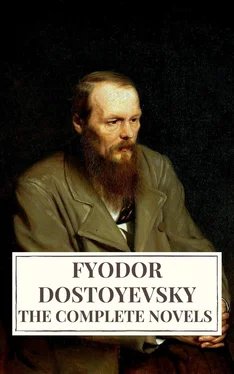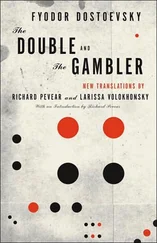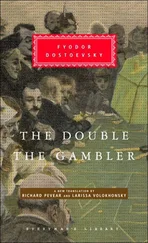Fyodor Dostoevsky - The Complete Novels of Fyodor Dostoyevsky
Здесь есть возможность читать онлайн «Fyodor Dostoevsky - The Complete Novels of Fyodor Dostoyevsky» — ознакомительный отрывок электронной книги совершенно бесплатно, а после прочтения отрывка купить полную версию. В некоторых случаях можно слушать аудио, скачать через торрент в формате fb2 и присутствует краткое содержание. Жанр: unrecognised, на английском языке. Описание произведения, (предисловие) а так же отзывы посетителей доступны на портале библиотеки ЛибКат.
- Название:The Complete Novels of Fyodor Dostoyevsky
- Автор:
- Жанр:
- Год:неизвестен
- ISBN:нет данных
- Рейтинг книги:5 / 5. Голосов: 1
-
Избранное:Добавить в избранное
- Отзывы:
-
Ваша оценка:
- 100
- 1
- 2
- 3
- 4
- 5
The Complete Novels of Fyodor Dostoyevsky: краткое содержание, описание и аннотация
Предлагаем к чтению аннотацию, описание, краткое содержание или предисловие (зависит от того, что написал сам автор книги «The Complete Novels of Fyodor Dostoyevsky»). Если вы не нашли необходимую информацию о книге — напишите в комментариях, мы постараемся отыскать её.
Poor Folk
The Double
Notes From The Underground
Crime and Punishment
The Gambler
The Idiot
The Possessed (The Devils)
A Raw Youth
The Dream of a Ridiculous Man
The Brothers Karamazov
The Complete Novels of Fyodor Dostoyevsky — читать онлайн ознакомительный отрывок
Ниже представлен текст книги, разбитый по страницам. Система сохранения места последней прочитанной страницы, позволяет с удобством читать онлайн бесплатно книгу «The Complete Novels of Fyodor Dostoyevsky», без необходимости каждый раз заново искать на чём Вы остановились. Поставьте закладку, и сможете в любой момент перейти на страницу, на которой закончили чтение.
Интервал:
Закладка:
All this flashed like lightning through his mind.
Porfiry Petrovitch returned quickly. He became suddenly more jovial.
"Your party yesterday, brother, has left my head rather… . And I am out of sorts altogether," he began in quite a different tone, laughing to Razumihin.
"Was it interesting? I left you yesterday at the most interesting point. Who got the best of it?"
"Oh, no one, of course. They got on to everlasting questions, floated off into space."
"Only fancy, Rodya, what we got on to yesterday. Whether there is such a thing as crime. I told you that we talked our heads off."
"What is there strange? It's an everyday social question," Raskolnikov answered casually.
"The question wasn't put quite like that," observed Porfiry.
"Not quite, that's true," Razumihin agreed at once, getting warm and hurried as usual. "Listen, Rodion, and tell us your opinion, I want to hear it. I was fighting tooth and nail with them and wanted you to help me. I told them you were coming… . It began with the socialist doctrine. You know their doctrine; crime is a protest against the abnormality of the social organisation and nothing more, and nothing more; no other causes admitted! … "
"You are wrong there," cried Porfiry Petrovitch; he was noticeably animated and kept laughing as he looked at Razumihin, which made him more excited than ever.
"Nothing is admitted," Razumihin interrupted with heat.
"I am not wrong. I'll show you their pamphlets. Everything with them is 'the influence of environment,' and nothing else. Their favourite phrase! From which it follows that, if society is normally organised, all crime will cease at once, since there will be nothing to protest against and all men will become righteous in one instant. Human nature is not taken into account, it is excluded, it's not supposed to exist! They don't recognise that humanity, developing by a historical living process, will become at last a normal society, but they believe that a social system that has come out of some mathematical brain is going to organise all humanity at once and make it just and sinless in an instant, quicker than any living process! That's why they instinctively dislike history, 'nothing but ugliness and stupidity in it,' and they explain it all as stupidity! That's why they so dislike the living process of life; they don't want a living soul! The living soul demands life, the soul won't obey the rules of mechanics, the soul is an object of suspicion, the soul is retrograde! But what they want though it smells of death and can be made of India-rubber, at least is not alive, has no will, is servile and won't revolt! And it comes in the end to their reducing everything to the building of walls and the planning of rooms and passages in a phalanstery! The phalanstery is ready, indeed, but your human nature is not ready for the phalanstery—it wants life, it hasn't completed its vital process, it's too soon for the graveyard! You can't skip over nature by logic. Logic presupposes three possibilities, but there are millions! Cut away a million, and reduce it all to the question of comfort! That's the easiest solution of the problem! It's seductively clear and you musn't think about it. That's the great thing, you mustn't think! The whole secret of life in two pages of print!"
"Now he is off, beating the drum! Catch hold of him, do!" laughed Porfiry. "Can you imagine," he turned to Raskolnikov, "six people holding forth like that last night, in one room, with punch as a preliminary! No, brother, you are wrong, environment accounts for a great deal in crime; I can assure you of that."
"Oh, I know it does, but just tell me: a man of forty violates a child of ten; was it environment drove him to it?"
"Well, strictly speaking, it did," Porfiry observed with noteworthy gravity; "a crime of that nature may be very well ascribed to the influence of environment."
Razumihin was almost in a frenzy. "Oh, if you like," he roared. "I'll prove to you that your white eyelashes may very well be ascribed to the Church of Ivan the Great's being two hundred and fifty feet high, and I will prove it clearly, exactly, progressively, and even with a Liberal tendency! I undertake to! Will you bet on it?"
"Done! Let's hear, please, how he will prove it!"
"He is always humbugging, confound him," cried Razumihin, jumping up and gesticulating. "What's the use of talking to you? He does all that on purpose; you don't know him, Rodion! He took their side yesterday, simply to make fools of them. And the things he said yesterday! And they were delighted! He can keep it up for a fortnight together. Last year he persuaded us that he was going into a monastery: he stuck to it for two months. Not long ago he took it into his head to declare he was going to get married, that he had everything ready for the wedding. He ordered new clothes indeed. We all began to congratulate him. There was no bride, nothing, all pure fantasy!"
"Ah, you are wrong! I got the clothes before. It was the new clothes in fact that made me think of taking you in."
"Are you such a good dissembler?" Raskolnikov asked carelessly.
"You wouldn't have supposed it, eh? Wait a bit, I shall take you in, too. Ha-ha-ha! No, I'll tell you the truth. All these questions about crime, environment, children, recall to my mind an article of yours which interested me at the time. 'On Crime' … or something of the sort, I forget the title, I read it with pleasure two months ago in the Periodical Review."
"My article? In the Periodical Review?" Raskolnikov asked in astonishment. "I certainly did write an article upon a book six months ago when I left the university, but I sent it to the Weekly Review."
"But it came out in the Periodical."
"And the Weekly Review ceased to exist, so that's why it wasn't printed at the time."
"That's true; but when it ceased to exist, the Weekly Review was amalgamated with the Periodical, and so your article appeared two months ago in the latter. Didn't you know?"
Raskolnikov had not known.
"Why, you might get some money out of them for the article! What a strange person you are! You lead such a solitary life that you know nothing of matters that concern you directly. It's a fact, I assure you."
"Bravo, Rodya! I knew nothing about it either!" cried Razumihin. "I'll run to-day to the reading-room and ask for the number. Two months ago? What was the date? It doesn't matter though, I will find it. Think of not telling us!"
"How did you find out that the article was mine? It's only signed with an initial."
"I only learnt it by chance, the other day. Through the editor; I know him… . I was very much interested."
"I analysed, if I remember, the psychology of a criminal before and after the crime."
"Yes, and you maintained that the perpetration of a crime is always accompanied by illness. Very, very original, but … it was not that part of your article that interested me so much, but an idea at the end of the article which I regret to say you merely suggested without working it out clearly. There is, if you recollect, a suggestion that there are certain persons who can … that is, not precisely are able to, but have a perfect right to commit breaches of morality and crimes, and that the law is not for them."
Raskolnikov smiled at the exaggerated and intentional distortion of his idea.
"What? What do you mean? A right to crime? But not because of the influence of environment?" Razumihin inquired with some alarm even.
"No, not exactly because of it," answered Porfiry. "In his article all men are divided into 'ordinary' and 'extraordinary.' Ordinary men have to live in submission, have no right to transgress the law, because, don't you see, they are ordinary. But extraordinary men have a right to commit any crime and to transgress the law in any way, just because they are extraordinary. That was your idea, if I am not mistaken?"
Читать дальшеИнтервал:
Закладка:
Похожие книги на «The Complete Novels of Fyodor Dostoyevsky»
Представляем Вашему вниманию похожие книги на «The Complete Novels of Fyodor Dostoyevsky» списком для выбора. Мы отобрали схожую по названию и смыслу литературу в надежде предоставить читателям больше вариантов отыскать новые, интересные, ещё непрочитанные произведения.
Обсуждение, отзывы о книге «The Complete Novels of Fyodor Dostoyevsky» и просто собственные мнения читателей. Оставьте ваши комментарии, напишите, что Вы думаете о произведении, его смысле или главных героях. Укажите что конкретно понравилось, а что нет, и почему Вы так считаете.












